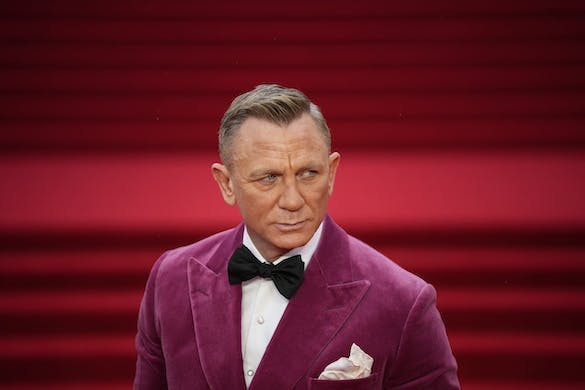James Bond, ‘Impervious to Death,’ Gains New Allure Amid Wait for Next 007
‘If Bond is immortal,’ Ian Fleming’s biographer says, ‘then it’s because he’s at once a hero of modernization and yet a symbol of retrospective power.’

“The name’s Bond, James Bond.” Few words are as British as those five, spoken by the man who can’t ever seem to die, neither in his adventures nor in the public imagination. Seventy years after the release of creator Ian Fleming’s first Bond book, “Casino Royale,” 007 is attracting new allure as speculation surges over who will portray him next.
A license to kill has, the tabloids are reporting, been offered to the actor Aaron Taylor-Johnson. That would make him the seventh star of the $7 billion film franchise, succeeding Daniel Craig. A fake trailer of actor Henry Cavill, who is reportedly another possible contender, playing the role has reached more than 1.5 million views. Although the 26th Bond film has yet to be officially announced, it’s clear the fans want it.
“The lower the sun has sunk on the empire Bond was born into, the more radiant his glow,” author Nicholas Shakespeare tells the Sun. He wrote the first authorized Fleming biography since 1966, “Ian Fleming: The Complete Man.” The book came out in America this month. “If Bond is immortal, then it’s because he’s at once a hero of modernization and yet a symbol of retrospective power. He serves as a modern, aspirational Everyman.”
So aspirational, indeed, that to know who first introduced Bond was a question on the 2020 test for British citizenship. Who else could parachute into the Olympic stadium with “Queen Elizabeth,” as, in his greatest stunt, he appeared to do 2012? “He is better known than God,” Fleming’s niece, Gilly, told Mr. Shakespeare. “All the Tibetans know of James Bond. They’ve never heard of God.”
That God-like popularity found firm footing across the pond. Over dinner in 1960, President Kennedy asked Fleming what Bond would do to topple Fidel Castro of Cuba. The head of his Central Intelligence Agency, Allen Dulles, was another big Bond fan. Inspired, he instructed an agency division to engineer gadgets like exploding cigars and poison-tipped shoes.
Bond is a reflection of Fleming. As the Empire retreated, and as Fleming sought to escape the mundanity of his marriage, the thrills of 007 exploded from the typewriter. Fleming bestowed onto Bond his stories as a naval intelligence officer during World War II. He gave him his love of scrambled eggs, golf, cigarettes, bourbon — and women, which, Mr. Shakespeare writes in his book, “carried the sexual climate of the Blitz into the austerity of the Cold War….”
Will that licentiousness resonate in 2024? Is Bond at risk of becoming a cultural fossil or political anachronism in the post-#MeToo era? Even Fleming, Mr. Shakespeare writes, got tired of Bond and wanted to kill him off by 1960, but found him “as impervious to death as was Dracula.” The co-producers of the Bond franchise, Barbara Broccoli and Michael Wilson, have confirmed a “reinvention” is under way with the next 007 pick.
Yet certain elements of a Bond character will never change, Mr. Wilson told Mr. Shakespeare: “He’s not going to take bribes — Bond is incorruptible, he’s patriotic, he’s doing it for Queen and King and country, and by extension Commonwealth. And we have a thing he should be male. But that’s about it.” Mr. Shakespeare lists another quintessential quality — attractiveness.
Bond is both human and superhuman, untouchable and accessible. “Fleming gave his readers license to imagine themselves in Bond’s shoes, in his car, in his bed, navigating the post-war world and its challenges with the aplomb of one of the elite,” Mr. Shakespeare says. To give readers a day-pass to his impossibly victorious life is, the biographer says, “the Bond effect.”
As John Pearson, who wrote the first authorized Fleming biography, put it: “Almost everyone has an element of Bond in them — or a would-be Bond.” Like everyone else, he suffers, he errs, he gets bored, “but Bond does actually have the power to go out and do something about it.” Be it Le Chiffre, Goldfinger, Blofeld, or the box office, 007 always wins.

